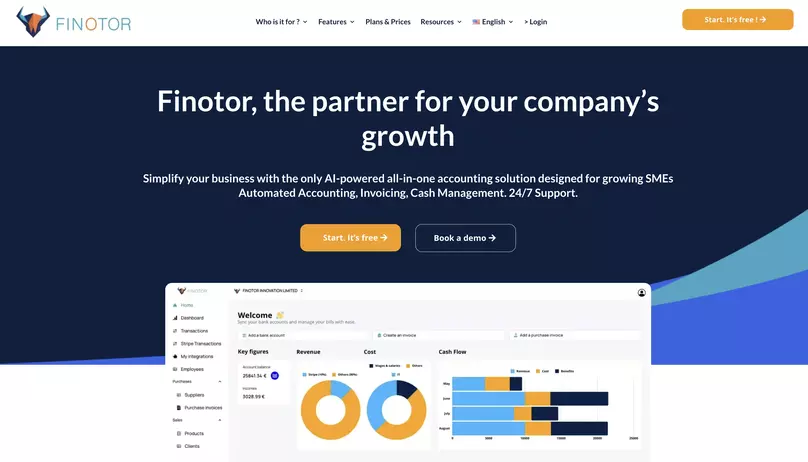Contents
Why Are Small Business Loans So Hard to Get?
For small business owners, securing the necessary funds to grow, expand, or even maintain operations is often a top priority. Unfortunately, obtaining a small business loan can be a daunting and frustrating process. The difficulty in securing financing leaves many entrepreneurs wondering why something seemingly straightforward—like getting a loan—has to be so complicated. This is where leveraging AI driven tools like Finotor, an all-in-one accounting and finance solution, can make a significant difference. By simplifying financial management, reducing the time spent on managing accounting, and offering a competitive price. Finotor helps small businesses to present a stronger case to lenders, increasing their chances of approval. Finotor also provides a personal, human and a professional support approach to guide you every step of the way. See here to ask our staff business-related accounting or finance questions. Starting a conversation is free.
Banks and lenders are inherently risk-averse institutions. They aim to minimize the chances of loan defaults, and small businesses are often considered high-risk borrowers. Statistics show that about 20% of small businesses fail within their first year, and nearly half don’t make it past five years. This high failure rate creates a risk profile that makes lenders cautious when evaluating small business loan applications. Finotor’s financial management tools, which include real-time cash flow tracking and detailed reporting, can help small businesses demonstrate financial stability to lenders, all while saving valuable time.
Lenders assess risk through several key factors, including:
- Revenue Stability: A steady and predictable revenue stream demonstrates the ability to repay the loan. However, startups, seasonal businesses, or companies experiencing rapid change may struggle to prove consistent cash flow. Finotor’s forecasting tools can provide data-driven insights to bolster your application, allowing you to focus on running your business instead of wrestling with complex financial reports.
- Creditworthiness: Both the business’s credit score and the owner’s personal credit score are scrutinized. Late payments, high credit utilization, or a lack of credit history can significantly impact loan eligibility.
- Industry Trends: Certain industries, such as restaurants or retail, are viewed as inherently riskier due to their competitive nature and narrow profit margins.
Example:
A small bakery might struggle to secure a loan because lenders perceive the food industry as volatile, even if the business shows promise. Strong financial records and an excellent credit score help to mitigate this perception. With Finotor’s intuitive and competitively priced accounting software, small businesses can ensure their financial records are accurate and professional, making them more appealing to lenders.
Stringent Lending Criteria
Small business loans often come with strict eligibility requirements. Traditional lenders, such as banks, require applicants to meet multiple criteria, such as:
- Detailed Financial Records: Lenders expect to see financial statements, including profit and loss statements, balance sheets, and cash flow reports. Finotor streamlines the preparation of these documents, saving business owners time and ensuring accuracy.
- Collateral: Many loans require collateral, such as real estate, equipment, or inventory, to secure the loan. If you don’t have enough valuable assets, your application may be denied.
- A Strong Business Plan: A comprehensive and well-articulated business plan shows lenders how you will use the funds and how the investment will yield returns. A vague or poorly crafted business plan can derail your application. Finotor offers a free business plan template and resources to guide you in crafting a compelling strategy, paired with personal support to answer your questions.
Example:
Imagine you own a small consulting business and apply for a $50,000 loan. If your business plan lacks specific financial projections or fails to outline how the loan will drive profitability, a lender may consider your application too risky.
Limited Lending to Startups
Startups face unique challenges in securing loans. Unlike established businesses, they lack the financial history and track record that lenders rely on to evaluate risk. This often makes it nearly impossible for startups to secure loans from traditional banks. While there are some lenders and programs specifically designed for startups, these often come with less favorable terms, such as higher interest rates, shorter repayment periods, or strict covenants.
Alternative Solutions for Startups:
- Venture Capital or Angel Investors: These funding options may offer significant capital, but they often require giving up equity in your business.
- Crowdfunding: Platforms like Kickstarter or Indiegogo allow startups to raise small amounts of capital from many contributors, but success requires a strong marketing effort.
- Online Lenders: Fintech companies may offer startup loans with more flexible requirements, although the cost of borrowing may be higher.
Using tools like Finotor’s financial management software can help startups track their cash flow, create reliable financial forecasts, and demonstrate potential to investors or alternative lenders. With Finotor’s competitive pricing and dedicated support, startups can build the strong financial foundation needed to succeed.
High Competition for Small Business Loans
The demand for small business loans often outweighs the supply, particularly during periods of economic uncertainty. Banks may tighten their lending practices, making it even harder for small businesses to qualify. This creates a competitive environment where only the most prepared and qualified applicants secure funding.
Tips to Stand Out:
- Present a Compelling Case: Ensure your application is thorough, accurate, and demonstrates the potential for growth.
- Focus on Building Credit: Establish and maintain a strong credit profile by reducing debt, paying bills on time, and keeping credit utilization low. Lenders value borrowers who demonstrate financial responsibility.
- Build Relationships: Establish connections with lenders early on to improve your chances when you’re ready to apply.
By leveraging Finotor’s accounting and reporting capabilities, you can save time, reduce errors, and present a polished application, making your business stand out in a crowded field.
The Complexity of the Application Process
Applying for a small business loan is often a lengthy and intricate process. The sheer volume of paperwork and time required can deter many business owners. Key challenges include:
- Paperwork Overload: Gathering and submitting financial statements, tax returns, legal documents, and bank statements can feel overwhelming. Finotor helps alleviate this burden by automating many accounting and reporting tasks.
- Time-Consuming Approval Process: After submission, applications undergo a detailed review process, which can take weeks or even months.
- Communication Gaps: Misunderstandings about what the lender requires, or incomplete applications can result in delays or outright denials.
Example:
A small retail business owner might struggle to compile the last three years of tax returns, especially if their bookkeeping isn’t up to date. Leveraging a robust accounting tool like Finotor, which saves time and reduces stress, can simplify the process by organizing and automating financial records. Plus, Finotor’s personal support team is available to answer any questions during this process.
Regulatory and Economic Factors
External factors also play a significant role in the difficulty of obtaining small business loans. For example:
- Regulatory Changes: Increased capital reserve requirements for banks can reduce the funds available for lending.
- Economic Conditions: During a recession or economic slowdown, lenders may become more conservative, making it harder for small businesses to secure loans.
These factors are largely outside the control of individual business owners, making it even more critical to prepare a strong loan application.
Tips to Improve Your Chances of Getting a Loan
Despite the challenges, there are actionable steps you can take to increase your chances of securing a loan:
- Boost Your Credit Score: Maintain both your personal and business credit scores in good standing by paying bills on time, reducing debt, and monitoring your credit reports regularly for errors.
- Organize Your Financials: Use accounting software like Finotor, an all-in-one solution that simplifies financial management for small businesses. With Finotor, you can generate professional-grade financial reports, monitor cash flow, and keep your records audit-ready.
- Develop a Solid Business Plan: Include detailed financial projections, market analysis, and clear goals. Finotor offers a free business plan template to help guide you through this process, along with professional support to address your specific needs.
- Explore Alternative Lenders: Consider online lenders, community banks, or credit unions, which often have more flexible requirements and faster approval processes.
- Strengthen Relationships: Build a positive history with your bank by maintaining active accounts and discussing your plans with a loan officer well before applying for a loan.
- Leverage Technology: Utilize tools like Finotor to streamline accounting and financial tracking, reducing the burden of manual processes and ensuring that your records are always up-to-date.
The Role of Accounting Software in Loan Applications
One often overlooked but critical tool in the loan application process is accounting software. Here’s how it can help:
- Streamlined Financial Reporting: Generate accurate and detailed financial statements quickly, demonstrating professionalism and preparedness.
- Cash Flow Tracking: Use real-time tracking to show lenders how you manage cash flow effectively.
- Tax Compliance: Ensure your tax filings are accurate and up to date, minimizing red flags for lenders.
- Expense Management: Track and categorize expenses effectively to demonstrate fiscal responsibility and ensure optimal allocation of resources. Lenders often view this as a sign of a well-run business.
With Finotor, these capabilities are not just accessible but also affordable and user-friendly. By reducing the time spent on managing your financial records and providing expert support, Finotor becomes a trusted ally in navigating the loan application process.
Conclusion
Securing a small business loan is undeniably challenging, but understanding the reasons behind these hurdles can help you prepare and improve your chances of success. From minimizing risk factors to meeting stringent lending criteria, and leveraging technology like accounting software, there are many ways to strengthen your application.
At Finotor, we are committed to helping small businesses thrive by offering a competitively priced, all-in-one accounting solution. Our tools are designed to save you time, reduce stress, and empower you with accurate financial insights. Combined with our personal, human, and professional support, we aim to simplify your financial management so you can focus on growing your business.
Whether you’re applying for a loan, managing daily operations, or planning for future growth, Finotor is here to help. Reach out to us today to learn more about how we can support your business’s journey toward financial success. Feel free to also ask any business accounting or finance questions you may have. Speaking to our staff is free and no matter the size of your business, we’re glad to help. Also, if you’re interested in Finotor and have any business peers, you can take advantage of our referral program which will offer you a discount on a Finotor subscription.
Small Business Loan FAQs
1. Why Is It Difficult for Small Business Owners to Get Loans?
Securing small business funding is challenging due to perceived risks like inconsistent cash flow, limited credit history, and the high failure rate of small businesses, especially in their first few years.
2. What Do Lenders Check Before Approving Small Business Financing?
Lenders evaluate steady cash flow, the business owner’s personal and business credit score, industry stability, detailed financial records, and collateral availability.
3. How Can I Improve My Chances of Getting a Small Business Loan?
To increase your chances, focus on improving your credit score, use software like Finotor to organize financial records, create a detailed business plan, and explore options like community lenders or local credit unions.
4. What Documents Are Needed to Apply for a Small Business Loan?
Lenders typically request financial reports (e.g., profit and loss statements, cash flow reports), tax returns, legal documents, and a well-prepared business plan.
5. Why Do Startups Have a Hard Time Getting Small Business Loans?
Startups often lack financial history and sufficient collateral. Alternatives such as crowdfunding, microloans, or startup-friendly online lenders can be more suitable for new businesses.
6. How Can Finotor Help Small Business Owners Secure Loans?
Finotor simplifies loan preparation by offering real-time cash flow monitoring, financial forecasting, and automated reporting, giving your business a professional edge when applying for financing.
7. What Are Some Alternatives to Small Business Loans?
Alternatives include SBA microloans, peer-to-peer lending, angel investors, venture capital, and crowdfunding platforms tailored for small or local businesses.
8. How Do I Make My Loan Application Stand Out?
Use tools like Finotor for polished financial reports, focus on building a strong business credit profile, and include detailed growth projections in your business plan to make your application stand out.
9. What Is the Role of Accounting Software in Small Business Financing?
Accounting tools, like Finotor, provide accurate financial reports, real-time cash flow insights, and expense tracking, making your business appear more stable and professional to lenders.
10. How Do Economic Conditions Affect Small Business Loan Approvals?
Economic slowdowns or regulatory changes can tighten lending criteria, making it essential for small business owners to prepare thoroughly and explore alternative funding options.









